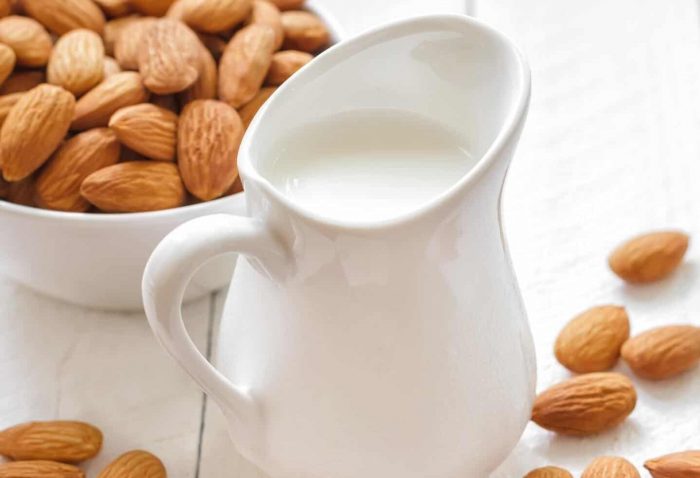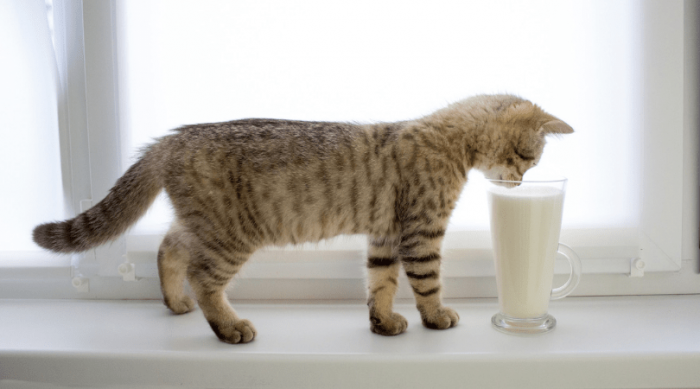When it comes to what to feed and what not to feed your cat, it is easy to make generalizations which can be a very costly mistake. Milk, generally, is a good source of nutrients for humans and animals and almond milk is a viable option, especially for vegans or people on dairy-free diets. As great as all these sounds, moderation is key in everything. Moreover, when it comes to keeping your pets healthy foods, it is better to give them what they need and eliminate the ones that they just want. So, what about almond milk for cats?
Table of Contents
Is It Safe To Give Almond Milk To My Cat?
Firstly, it is pertinent to point out that nothing in milk is toxic or lethal to cats. But moderation is key when it comes to feeding your cat anything.
Almond milk is produced by crushing almonds, mixing the pulp with water and collecting the fluid. It has a subtle nutty flavour. Even though almond itself is a good source of fat, protein, vitamin E, fibre and magnesium, the milk that comes out of it contains less of these healthy nutrients as many brands add preservatives, artificial sweeteners, sugar and flavours which is where the problem comes from.
On the bright side, if you can get a good one or make it yourself, almond milk for cats is a better option if you must feed them milk. It is considered safe as it lacks some of the things that make dairy products uncomfortable for some people.
Moreover, compared to other types of milk, almond milk does not contain any dairy products which means there is no lactose. This is one of the reasons why it might be a safe option. It also doesn’t contain any ingredient known to be toxic to cats and your cat will most likely love the taste.
Here are a few precautions to observe when giving your cats almond milk;
- Start small to gauge your cat’s tolerance level
- Observe your cats bowel movements and watch out for signs of indigestion after her first slurp
- Do not give more than 4 cups within a 24-hour period

Can Cats Drink Coconut Milk, Soy Milk, And Cow Milk?
Asides from almond milk for cats being a good alternative to dairy products, there are different kinds of milk and you need to know a few things before feeding them to your pet. Cats generally don’t produce much of the lactose enzyme necessary for the healthy digestion of milk. This can result in tummy aches, gas, bloating, vomiting or diarrhea, and general distress.
Another risk of giving your cat any form of milk is the extra calories they can gain which can contribute to obesity. Let’s explore these types of milk one after the other and see how safe they are for your feline companion.
Coconut Milk
This kind of milk is very unconventional and it has been one of the top alternatives given to cats as a treat since it is considered a dairy-free milk alternative. On a closer look, it might be difficult to digest for your feline companion. Even though some consider it a safe option for cats, the downside is that it contains a high amount of fat and oils which isn’t good for cats. In all, coconut milk for cats is not a bad idea but don’t overindulge.
Soy Milk
Soy milk is another good substitute for cow milk for people with allergies or those who are lactose intolerant. Soy milk is known as a plant-based drink made out of saturated soybeans. It is safe for cats as it doesn’t contain any poisonous or toxic ingredients and has a good quantity of necessary amino acids. Notwithstanding that it is safe for cats, too much of it can result in serious thyroid and liver issues. Some of them also contain too many additives and sweeteners which can upset your cat’s sensitive stomach. Nonetheless, just the way you would prepare almond milk for cats at home, you can equally make this to be sure of what goes inside it.
Cow Milk
One thing is very clear here, cow milk contains lactose. Cat owners are growing increasingly aware that cats are lactose intolerant which makes cow milk unsuitable for them. Consumption of cow milk can lead to diarrhea, vomiting, and other gastrointestinal distress. From the foregoing, you might want to keep some types of milk away from your cat or give them in moderation to avoid health issues.
What Kind Of Milk Is Best For Cats?
Experts recommend that cats consume milk specially formulated for them that has reduced lactose content or totally free of it.
When it comes to giving your cat milk, there is no one size fits all as there will always be preferences for different cats. Experts would advise not to feed your cat any form of milk at all for their health benefits but some still agree that it can be an occasional treat. Almond milk for cats remains a good choice anytime the need arises.
Read Also: Are Calico Cats Always Female? Everything You Need To Know
Human Foods Cats Can Eat
Most major food groups have items that can safely be served to cats. But it is good to remember that human foods should be an occasional treat not a typical occurrence for your cat. This is to avoid obesity and to make sure your cat is getting the right amount of nutrients. Moreover, some human foods are known to contain toxic substances that can harm your pet over time.
Here are some human foods that can be given to cats – meats, chicken, fish, turkey, and eggs. Vegetables like peas, broccoli, carrots, asparagus, and green beans. Fruits like banana, cucumber, peeled apples, blueberries, pumpkin, and avocado. Grains like cooked corn, couscous, bread, oats, brown rice, barley, or wheat berries.
This list isn’t exhaustive in any way as every cat owner has to watch out for what works for their own cats. Overall, if you must give human foods to your cat, monitor how it reacts to it and know the limits.
